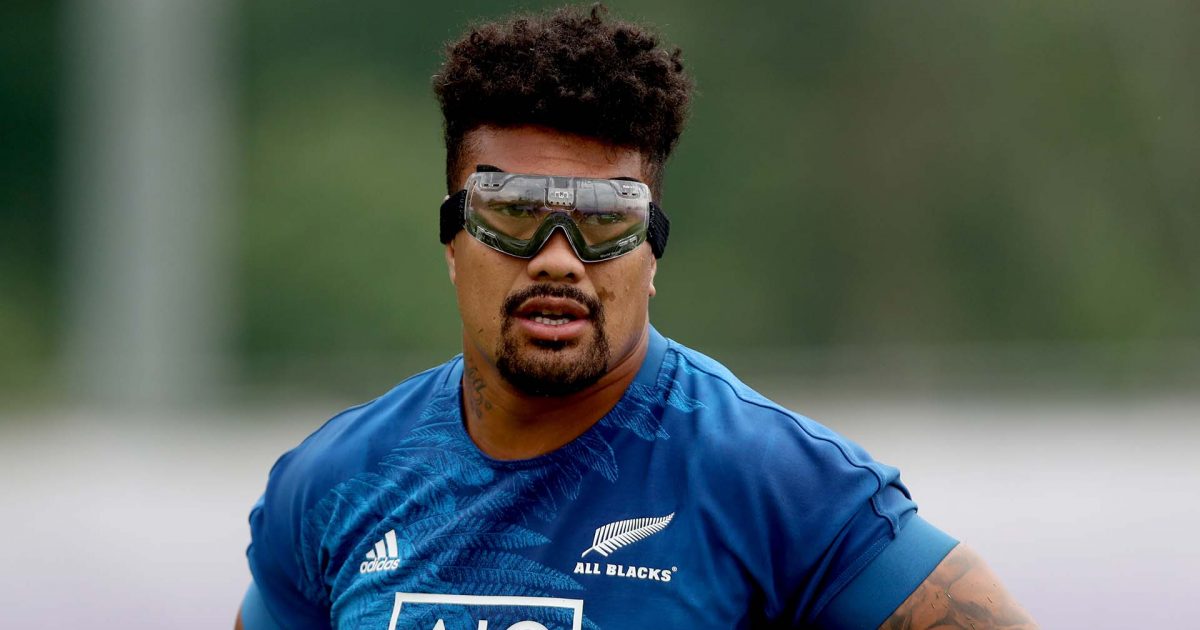Ardie Savea open to bringing goggles back after World Cup trial run

All Blacks star Ardie Savea has revealed he is open to bringing back the goggles he briefly wore at the 2019 World Cup in Japan.
Savea made headlines around the globe two years ago when it was announced that he would wear protective eyewear for his side’s pool match against Canada.
During a second half appearance in his side’s 63-0 rout in that match, the 28-year-old only wore the goggles for a short amount of time, and never used them for New Zealand’s following clash against Namibia as they fogged up in the Tokyo humidity.
When it was first announced that he would wear the eyewear, Savea said he would do so to protect his left eye when he realised his vision was deteriorating, leaving his vision blurry out of that eye.
The 59-test international hasn’t worn the goggles since then, though, and while he has previously suggested that he will persist with the eyewear, he is yet to make a comeback with them.
That could change if modifications are made to create a more effective pair of goggles, Savea told his former Hurricanes teammate James Marshall in a recent episode on the What A Lad podcast.
Recounting his trial run with the goggles at the World Cup two years ago, Savea explained that his eye problem is a scratched cornea, which he said was the result of “rubbing too much” and was comparable to a crack in the middle of a windscreen.
As such, he was encouraged by All Blacks doctor Tony Page to wear the goggles, which Savea said he didn’t even know existed until the pool stages of the World Cup.
“I didn’t know about the goggles until the pool games in the World Cup. I knew I had problems with my left eye, and it wasn’t until the World Cup… I realised that this was real blind, like I can’t see,” Savea told What A Lad.
“You [Marshall] go all blurry when I see you. I just happened to open my mouth to doc, and then doc went all serious and did all this research and was like, ‘Mate, you need to wear these goggles’, because, pretty much, my left eye, it can’t get any better.
“If I get a knock to this eye, I could potentially be blind, so that was what he was saying.
“He was like, ‘Bro, you’ve gotta protect it’, and I was like, ‘Mate, I’ve been playing like this all good’, and he was like, ‘Nah, you’ve gotta wear it, you’ve gotta wear it, try it’.
Ardie Savea has listed the most promising youngsters coming through the ranks at the Hurricanes and named the one player he would sign for the franchise. #Hurricanes #SuperRugbyPacific https://t.co/HTXJ5l7giG
— RugbyPass (@RugbyPass) December 13, 2021
“Then he spoke to Steve [Hansen, former All Blacks head coach], and Steve was like, ‘Son, you’ve gotta wear this, it’s a great example for young players and a lot of the people you inspire’.
“As soon as he said that, I was like, ‘Okay, for the people’, and then wore it. So, I tried them and didn’t work out as well as I would like, but if there were better ones, then I’d definitely try.”
In addition to the difficulties of wearing the goggles in humid conditions, part of the reason the experiment didn’t work out as Savea intended was due to the way in which opposition players were able to pull and prod the contraption in the contact area.
Savea told What A Lad that there was one instance during the World Cup where an opposing player did just that, resulting in him to ditch the goggles mid-match.
“When I wore them, it was the worst place to try them out because of the humidity in Japan, like it was crazy,” he said.
“Then I wore them in the game… but as soon as I was bridging over a ruck, the [Canadian] dude grabbed it, just pulled it, and I looked up, and he was just smiling at me and just ran off, and I was like, ‘These guys are just messing with my head’, so I took it off, just threw it.”
However, if the goggles are modified to make them easier to wear during matches, Savea said he would wear them again.
“If they find a way where it can stay on your head and are comfortable in the contact area, I would wear them to protect my eye.”
Listen to Ardie Savea’s interview on the What A Lad podcast below:


































The media coverage that the last attempt received was embarrassing. He was going to be the hero of the men, women and children of the universe who had vision issues. Nek minnit the goggles had fogged up after 5 minutes and were gone 😄